- Actors and Acting (55)
- Alfred Hitchcock (7)
- Alida Valli (1)
- American Idol Wins Gold During Sweeps Month (1)
- Anecdote of the Week (26)
- Audrey Hepburn (4)
- Ava Gardner (7)
- Baghdad and Boobs (1)
- Barbara Stanwyck (12)
- Basil Rathbone (4)
- Bette Davis (15)
- Billy Wilder (12)
- Blogathons (18)
- Brian Aherne (2)
- But You Cant Quit (1)
- Charles Boyer (5)
- Charles Laughton (10)
- Charlie Chaplin (6)
- Come On Down (1)
- Constance Bennett (10)
- crabby dissent (11)
- Culture-lite. (1)
- Cyd Charisse (4)
- dance on film (8)
- David Hemmings (1)
- David O. Selznick (10)
- Douglas Sirk (9)
- Ernst Lubitsch (10)
- Family Drama Ya Little Maggot (1)
- For the Love of Film (11)
- Foreign Film of the Week (4)
- foreign films (6)
- Frances Farmer (2)
- Frank Borzage (8)
- Fred Astaire (3)
- Fritz Lang (5)
- Gene Kelly (6)
- Gene Tierney (7)
- George Cukor (11)
- George Sanders (11)
- Ginger Rogers (7)
- Gone with the Wind (3)
- Hedy Lamarr (6)
- Howard Hawks (9)
- Humphrey Bogart (4)
- Ida Lupino (8)
- in memoriam (17)
- Ingrid Bergman (4)
- Inkspot today (1)
- IT'S ALIVE (1)
- Jack Cardiff (5)
- Jack Carson (7)
- James Cagney (9)
- James Mason (2)
- James Stewart (4)
- James Wong Howe (10)
- Jean Negulesco (6)
- Jean Simmons (1)
- Jennifer Jones (1)
- Joan Crawford (11)
- Joan Fontaine (18)
- John Barrymore (17)
- John Ford (8)
- John Garfield (8)
- Josef von Sternberg (3)
- Joshua Logan (1)
- Kay Francis (6)
- Kimber's Kraziness (1)
- Lana Turner (3)
- Leslie Caron (2)
- links (2)
- lists (18)
- Little Girl - WOW (1)
- Luise Rainer (2)
- Marilyn Monroe (3)
- Martin Scorsese (1)
- Mary Astor (8)
- Maureen O'Hara (3)
- Max Ophuls (9)
- Merle Oberon (2)
- Michael Curtiz (2)
- Michael Powell (4)
- Miriam Hopkins (1)
- Mitchell Leisen (4)
- Montgomery Clift (2)
- Movie Books (11)
- movies in brief (17)
- movies in depth (34)
- Mr. Uncertain (1)
- Music . I Know (1)
- Musicals (6)
- Myrna Loy (8)
- New York City of the Mind (10)
- Norma Shearer (3)
- Orson Welles (6)
- Oscars (11)
- polite dissent (12)
- Preston Sturges (5)
- Prince Poppycock on America's Got Talent (1)
- Production Code (8)
- Raoul Walsh (1)
- Robert Wise (1)
- Samuel Goldwyn (8)
- Sandra Dee (1)
- Shadows of Russia (9)
- Silent Movies (8)
- Simone Simon (1)
- Step Into an Enchanted World (1)
- Stop Filming Me (1)
- Sweet Home (1)
- Sydney Greenstreet (9)
- TCM (37)
- That Rhymes and that Stands for Pool (1)
- Thoughts on Fatherhood. (1)
- Val Lewton (1)
- Vera Zorina (2)
- Vincente Minnelli (3)
- weblog awards (2)
- William Wellman (7)
- William Wyler (13)
- Writing (1)
- You Can Puke (1)
Followers
One of the best blogs around is run by the estimable Goatdog. Right now he is calling for a 1927 Blogathon for the weekend of March 23-25. The Siren signed up right away, since one of her New Year's resolutions is to see more silent films. What, you may ask, can one blog about with a 1927 theme? Well, Thom at Film of the Year has some suggestions. You can also head over to the completely fabulous Silent Era site and check out their archives for films made in 1927. If you want to participate, just drop Goatdog a line at goatdogsmovies@gmail.com.
Meanwhile, the Siren is still sprucing up the sidebar, adding Check the Fien Print, Film of the Year, Rebel Without a Cause and the great Jim Emerson, even though his format won't let her comment over there. Also added is The Easy Ace, Jeff Kallman's journal of vintage radio. The Siren has been listening to goodies like Double Indemnity as re-enacted by Ida Lupino and Groucho Marx.
Above, from 1927: Greta Garbo and John Gilbert in Flesh and the Devil.
 When you see Ace in the Hole (and the Siren does hope that is "when"), you will immediately understand why, upon its first release, the movie stiffed colder than Harry Cohn's heart. Austrian-born Billy Wilder always claimed affection for his adopted country, but you would never know it from this very great movie and its portrait of what H.L. Mencken called the species Boobus Americanus. There we are--grasping, foolish, gullible, addicted to lousy food and cheap entertainment, as distractible as a toddler. This film is bitter medicine even in 2007. Send not to know for whom the bile flows--it flows for thee.
When you see Ace in the Hole (and the Siren does hope that is "when"), you will immediately understand why, upon its first release, the movie stiffed colder than Harry Cohn's heart. Austrian-born Billy Wilder always claimed affection for his adopted country, but you would never know it from this very great movie and its portrait of what H.L. Mencken called the species Boobus Americanus. There we are--grasping, foolish, gullible, addicted to lousy food and cheap entertainment, as distractible as a toddler. This film is bitter medicine even in 2007. Send not to know for whom the bile flows--it flows for thee.
Ace in the Hole's Charles Tatum (Kirk Douglas at his best) is a big-city reporter, a sharp cookie who's made himself unemployable. When the movie opens he is talking his way into a job in New Mexico, despite his open contempt for the surroundings. "Even for Albuquerque, this is pretty Albuquerque," is his review of the local paper. With a single dissolve, Wilder establishes the passage of a year, and we find Tatum's contempt has turned to desperation. He hasn't found a single story capable of getting him back into large circulation. But while on his way to cover a rattlesnake roundup, Tatum stumbles across a one-stoplight town called Escadero. There, Leo Minosa (Richard Benedict) lies trapped by a cave-in after going too far into an Indian burial site. Here's the human-interest story Tatum's been waiting for--if only Minosa will stay buried long enough for the reporter to milk the pathos.
The local contractor believes he can rescue Leo just by shoring up the walls, which would take about 16 hours. Good for Leo, bad for Tatum. With the connivance of the local sheriff, who is up for re-election, Tatum strong-arms the contractor into drilling through the top of the mountain, a process that could take five days. Thus begins the great ghoulish parade of people seeking something out of Leo's plight. Tatum, of course, wants his career back. His sidekick Herbie (Bob Arthur), a callow young photographer, wants to hitch his wagon to Tatum's. Leo's wife Lorraine, played so dense and so hard by Jan Sterling you could use her to pound a piling, wants out of her Escadero existence and away from the sad-sack Leo.
You can read this movie as an attack on tabloid journalism, which it certainly is, but the press isn't the main target. Tatum is a heel, but he does have a conscience, albeit one that kicks him only faintly and too late. None of these characters have pretty motives, but worst of all are the crowds of people who arrive to camp out, buy souvenirs and eat junk food while waiting for a man to be rescued or to die. Wilder includes a beautiful long shot of a train pulling into Escadero after years of passing the whistle-stop by. What pangs trouble the passengers as they jump out, so eager to mill outside a possible tomb that they leap before the train stops moving? The same that trouble millions of reality-TV viewers, that is to say, none. The throngs believe they are just indulging their God-given American right to be entertained.
Wilder didn't much care for the common American, but he dearly loved the common man's lingo. Here he uses the matchless variety of mid-century Americanese like a dimmer switch, taking the movie from bright to dark. The script starts off funny, as Douglas delivers each staccato burst of sarcasm con brio. "I can handle big news and little news. And if there's no news, I'll go out and bite a dog," he says. To the Albuquerque paper's editor, Jacob Q. Boot (Porter Hall), he remarks, "I've done a lot of lying in my time. I've lied to men who wear belts. I've lied to men who wear suspenders. But I'd never be so stupid as to lie to a man who wears both belt and suspenders." Asked if he drinks, Tatum says, "Not a lot. Just frequently."
The one-liners continue, finally climaxing in the biggest laugh of the picture, Jan Sterling to Douglas: "I've met some hard-boiled eggs in my time. But you? You're twenty minutes." The laughs are quieter from that moment, until all smiles cease together, as Leo's chances get smaller. Nobody laughs when, late in the movie, Douglas tells Boot, "I'm on my way back to the top, and if it takes a deal with a crooked sheriff, that's all right with me! And if I have to fancy it up with an Indian curse and a brokenhearted wife for Leo, then that's all right too!"
As scalding as he is, Wilder doesn't leave audiences utterly without hope. A Wilder picture almost always has at least one character who acts as moral grounding--Edward G. Robinson in Double Indemnity, Arlene Francis in One, Two, Three, Nancy Olson in Sunset Boulevard. You can measure the movie's cynicism by the amount of respect and exposure that character gets. The Apartment, often called bitter, is one of Wilder's most optimistic films, in that the character whose essential decency anchors the movie turns out also to be the protagonist, Jack Lemmon.
In Ace in the Hole, the last good man is the editor Boot. He has about four brief scenes. He may believe in truth, so much so he has his secretary cross-stitch "Tell the Truth" on a sampler, but he is badly outnumbered.
Ace in the Hole is based in part on the real-life story of Floyd Collins. In the movie Tatum talks about the incident, without mentioning Collins' eventual death. No, what's notable to Tatum is the payoff for the reporter on the scene. Listen for Douglas, saying "Pulitzer Prize" the way you hear "Medal of Honor" intoned in a John Wayne movie.
According to Wilder biographer Ed Sikov, the movie also has roots in the even more tragic story of Kathy Fiscus , a three-year-old who fell down a well in 1949. Jockeys showed up, offering to be lowered to rescue her, as did the Philip Morris cigarette midget and some other little people from the circus. This may have sparked Wilder's decision to create the full-scale carnival that springs up next to Leo's mountain prison. See the director's camera come to rest on the trucks delivering the Ferris Wheel and other fairground rides: "The Great S&M Amusement Corp." Sikov notes that head Production Code enforcer Joseph Breen objected to the word "lousy" in the script, but apparently the carnival name flew right over Breen's flat little head.
He didn't work on the script, but we'll let later Wilder collaborator I.A.L. Diamond have the last word, as quoted in Sikov's biography:
Sure, they called it cynical. And then you see thousands and thousands of people turning up at Idlewild airport in New York to watch a plane coming down with bad landing gear. People clog the runway waiting for it to crash--and you ask yourself how cynical Ace in the Hole really was.
Note: This entry is cross-posted at Newcritics, a new outpost for Web criticism that is the brainchild of Tom Watson. The Siren hopes you will visit it frequently.
Additions include the intelligent and fascinating Michael Guillen and Andy Horbal. I have also added Gloria, whose comments are one of this blog's best aspects. She has a great site herself, focusing on all things Charles Laughton. Tonio Kruger's eclectic Confessions of a Half-Breed Prince is up too, as is Phil Nugent's No More Mr. Nice Blog, Tuwa's Shanty and Emma's All About My Movies.
Also added is a great blog I discovered by accident, Operator 99's Allure. I had been reading the memoirs of film director Tay Garnett (who was married to none other than Patsy Ruth Miller, and directed One-Way Passage and The Postman Always Rings Twice, among more than 100 films). Garnett wrote of a starlet named Jeanette Loff, who married a producer named Bert Friedlob and died young. I tried to look up more on Loff but found almost nothing worthwhile until I stumbled across this blog. (Here she is, if you want to see her.) It consists of rare picture-postcards of stars both famous and obscure, together with enough trivia to make a film buff's heart go pitter-patter. Check it out, but be warned you will spend at least an hour poring through the archives.
I am sure I am forgetting someone. If I have, please email me and I will add your URL, while I am still feeling brave about venturing into the sidebar thickets.
It's that time of year again, and the wonderful film blogger Edward Copeland has unleashed another of his Oscar surveys. This time, we rate the Best Actresses, naming the five best, in descending order, and the five worst, also in order. Polish your rear-view mirrors and sharpen your hindsight, and send Mr. Copeland a ballot. Here is the Siren's.
Best of the Best: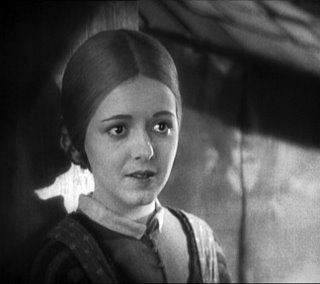 1. Janet Gaynor Sunrise, Seventh Heaven, Street Angel
1. Janet Gaynor Sunrise, Seventh Heaven, Street Angel
The Siren is cheating a bit here, since she has seen only Sunrise. But Sunrise, she assures you, is sufficient unto itself. One viewing of Gaynor's performance is worth hours of wrist-crippling typing about the lost art of silent acting. She will break your heart.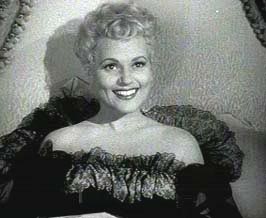 2. Judy Holliday, Born Yesterday
2. Judy Holliday, Born Yesterday
Apologies to Diane Keaton, but this is the greatest comic performance to win a Best Actress Oscar. Holliday's reactions are a joy forever. The first time the Siren rented this, she kept rewinding the shot of Holliday inching her head toward the dictionary when the corrupt Congressman uses a word she doesn't know. So many wonderful touches, like her imitation of the drum rolls on "I Can't Give You Anything But Love" - a sure sign Billie Dawn is playing the whole record in her head, the better to tune out Broderick Crawford. Holliday didn't even have to deliver her matchless "Drop dead," because the Siren was already on the floor laughing from just watching her turn around on the staircase.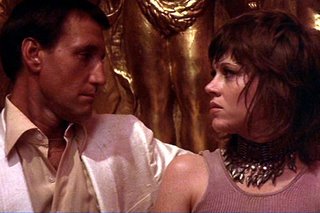
3. Jane Fonda, Klute
Screen acting at its most truthful. An amazing demonstration of disappearing into a character, all the more so when you consider that the movie is good but not great. It's a standard prostitute-in-peril yarn, with a problematic plot that reveals the killer in mid-film and leaves the wheels spinning afterward. But the Siren was astonished at the layers of personality Fonda brought to the character of Bree. This should have been the screen hooker to give all the others the hook. (Aside: does IMDB really have to link to external "reviews" that are just rants about "Commie Fonda"?)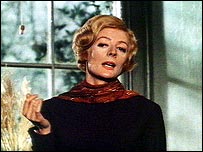 4. Maggie Smith, The Prime of Miss Jean Brodie
4. Maggie Smith, The Prime of Miss Jean Brodie
We're frequently admonished to appreciate our hardworking, underpaid teachers. What is left unmentioned, though, is that bad teachers can affect your future as much as the inspirational ones. For many women, Maggie Smith's performance lingers as an emblem of some past teacher whose mark on their lives was more like a stain. Smith makes Jean Brodie, a Fascist sympathizer who damages lovers and students, both monstrous and moving. Miss Brodie's artistic affectations, her carefully cultivated posture and self-dramatizing gestures, are rendered in minute detail, and such is Smith's talent that at no time does the portrayal shade off into caricature. 5. Joan Crawford, Mildred Pierce
5. Joan Crawford, Mildred Pierce
Practically the Siren's first thought upon learning of this survey was, "Damnit, I'm including Joan." Bear with me here. In no way is this a naturalistic performance. Who cares? It is an endlessly re-watchable piece of High Hollywood Acting, with Joan Crawford hurling her star power around like a flamethrower. Is she subtle? Hell, no. It isn't a subtle movie. But Crawford grabs your attention, sympathy and yes, belief as she rips apart her marriage, home and the scenery to Sacrifice All for her worthless daughter Veda. Look the Siren deep in the eye. Would you really, truly rather watch Sophie's Choice again, or see Joan haul off and slap Ann Blyth?
Worst of the Best: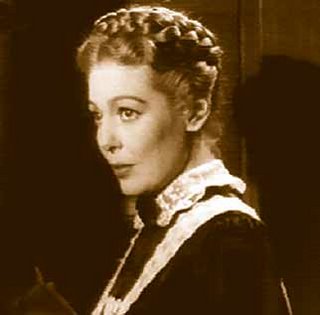 1. Loretta Young, The Farmer's Daughter
1. Loretta Young, The Farmer's Daughter
Understand, please, that the Siren loves corny. She lives for corny. Well, actually, she lives for romantic, followed closely by sophisticated, then witty, then spectacular and THEN she lives for corny. But there is corny, and there is saccharine. And this could induce diabetic coma. If Young's yumpin' yiminy accent doesn't appall you, her Princess Leia cinnamon-bun hairdo will. The Siren couldn't find a picture of that, but the braid crown at left is almost as bad. Young was quite bearable in a few movies, but she hasn't the ability to make this purehearted rustic believable or even interesting. The Siren has no idea why Young won.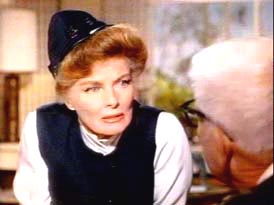 2. Katharine Hepburn, Guess Who's Coming to Dinner?
2. Katharine Hepburn, Guess Who's Coming to Dinner?
The Siren feels churlish naming this, because we all know Spencer Tracy was dying when this movie was made, and it must have affected Hepburn a great deal. But what does Kate really do here, besides gaze mistily at Spence?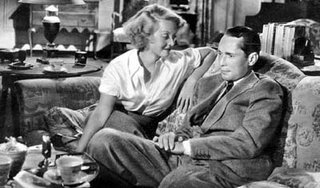 3. Bette Davis, Dangerous
3. Bette Davis, Dangerous
She wasn't even nominated for Of Human Bondage, so this is one of those consolation Oscars they give out to this day, and shouldn't. You would never know Davis was a peerless screen artist by viewing this shrill, silly, damn near unwatchable performance in an extremely tiresome movie.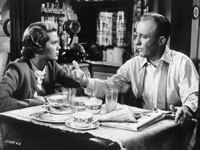 4. Grace Kelly, The Country Girl
4. Grace Kelly, The Country Girl
"It's the biggest robbery since Brink's," cabled Groucho Marx to Judy Garland, whose career-topping performance in A Star Is Born lost to Grace Kelly's willingness to wear eyeglasses and a frumpy dress. The Siren swears she isn't naming Kelly out of pique. She loves Grace Kelly, who doesn't? But this performance is pedestrian, with the actress unable to suggest her character's longing or her sense of entrapment. Instead, what she projects is primarily petulance. 5. Elizabeth Taylor, Butterfield 8
5. Elizabeth Taylor, Butterfield 8
"Even I voted for her," remarked wronged wife Debbie Reynolds, when a dire illness landed Liz in the hospital and gave her this sympathy Oscar. To her immense credit, Taylor has always said she knew she didn't deserve the award. Unfortunately, she was right. Granted, Gloria Wandrous is a ludicrous projection of misogyny, possibly unplayable as written. Plus there's the problem of Taylor's leading man, of whom Jane Fonda said, "Acting with Lawrence Harvey is like acting by yourself. Only worse." Still, it is evident that Taylor made this movie while on an actress setting we could call Slut Auto-Pilot.
So that's the Siren's list. Tell her what you think in the comments, but do send your list to Mr. Copeland by Jan. 20.


